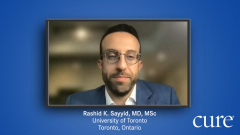
Androgen Deprivation Therapy for Prostate Cancer
Alicia Morgans, MD, MPH, discusses androgen deprivation therapy and its role in treating prostate cancer.
Episodes in this series

Transcript:
What is androgen deprivation therapy?
Alicia Morgans, M.D., MPH: Androgen deprivation therapy, sometimes called ADT or hormonal therapy, is a way of treating prostate cancer that is used pretty ubiquitously or used pretty uniformly for patients when the cancer is more advanced or has spread outside of the prostate, perhaps even throughout the body. This form of treatment is not giving androgens or giving hormones but actually decreasing hormone levels, particularly testosterone, that male hormone that goes up in patients or individuals when they go through puberty, and is also the hormone that drives prostate cancer cells to grow, divide, spread and cause the trouble that they cause.
When we use androgen deprivation therapy, we are lowering testosterone levels typically by turning off the testes from making testosterone. This starves cancer cells, causing them to shut down, causing some to essentially self-destruct or die, and causing others to go into a deep hibernation state where they are not going to be able to grow, divide, spread and cause trouble. They just sort of sit still and shrink. And that from a patient perspective and from a doctor perspective is really important and is what we want. We want to shut it all down. There are other things that we can add that are more hormonal therapies to further decrease that testosterone from driving cancer cells. But the ADT, or androgen deprivation therapy, is really just shutting off the testes.
It's important to know that there are several types of ADT. Of course, one is a surgical type, so you can remove the part of the testes on both sides that makes testosterone, and that's a surgical procedure. But more commonly, people use medications to have ADT or use treatment with ADT. Those medications can either be GnRH agonists, which is just a type of a hormonal therapy that causes a surge in testosterone before it causes low levels. That needs to be considered when you're starting the treatment. The other kind, which is a GnRH antagonist, causes the testosterone levels to go down right away. Both of these are really effective ways of lowering testosterone. They are both used really commonly, and they both can be given as injections. The GnRH antagonist form can also be given as a pill. There are lots of different ways and options for us to cause androgen deprivation and to treat prostate cancer with hormonal deprivation therapy. It's important with talk to your doctor about which one might be right for you.
Transcript is AI-generated and edited for clarity and readability.







